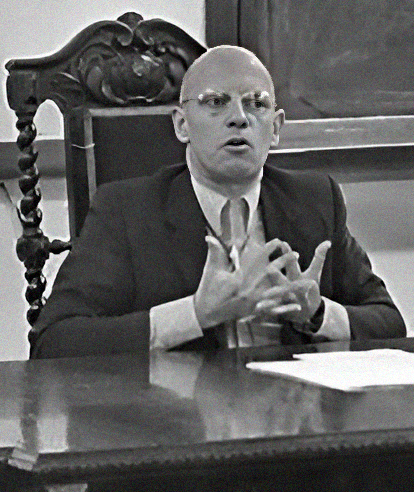
Michel Foucault
Philosopher, Author
1926 – 1984
Who was Michel Foucault?
Michel Foucault was a French philosopher, historian of ideas, social theorist, philologist and literary critic. His theories addressed the relationship between power and knowledge, and how they are used as a form of social control through societal institutions. Though often cited as a post-structuralist and postmodernist, Foucault rejected these labels, preferring to present his thought as a critical history of modernity. His thought has been highly influential for both academic and activist groups.
Born in Poitiers, France to an upper-middle-class family, Foucault was educated at the Lycée Henri-IV and then the École Normale Supérieure, where he developed an interest in philosophy and came under the influence of his tutors Jean Hyppolite and Louis Althusser. After several years as a cultural diplomat abroad, he returned to France and published his first major book, The History of Madness.
Famous Quotes:
- We need to cut off the King´s Head: in political theory that has still to be done.
- Power is not an institution, and not a structure; neither is it a certain strength we are endowed with; it is the name that one attributes to a complex strategical situation in a particular society.
- The judges of normality are present everywhere. We are in the society of the teacher-judge, the doctor-judge, the educator-judge, the social worker -judge.
- Freedom of conscience entails more dangers than authority and despotism.
- Chance does not speak essentially through words nor can it be seen in their convolution. It is the eruption of language, its sudden appearance. It's not a night twinkle with stars, an illuminated sleep, nor a drowsy vigil. It is the very edge of consciousness.
- The strategic adversary is fascism... the fascism in us all, in our heads and in our everyday behavior, the fascism that causes us to love power, to desire the very thing that dominates and exploits us.
- There are more ideas on earth than intellectuals imagine. And these ideas are more active, stronger, more resistant, more passionate than politicians think. We have to be there at the birth of ideas, the bursting outward of their force: not in books expressing them, but in events manifesting this force, in struggles carried on around ideas, for or against them. Ideas do not rule the world. But it is because the world has ideas... that it is not passively ruled by those who are its leaders or those who would like to teach it, once and for all, what it must think.
- The work of an intellectual is not to mould the political will of others; it is, through the analyses that he does in his own field, to re-examine evidence and assumptions, to shake up habitual ways of working and thinking, to dissipate conventional familiarities, to re-evaluate rules and institutions and to participate in the formation of a political will (where he has his role as citizen to play).
- In its function, the power to punish is not essentially different from that of curing or educating.
- The lyricism of marginality may find inspiration in the image of the outlaw, the great social nomad, who prowls on the confines of a docile, frightened order.
We need you!
Help us build the largest biographies collection on the web!
- Born
- Oct 15, 1926
Poitiers - Also known as
- Paul-Michel Foucault
- Parents
- Siblings
- Religion
- Atheism
- Catholicism
- Nationality
- France
- Profession
- Education
- École Normale Supérieure
(1946 - ) - Lycée Henri-IV
(1930 - 1936) - Collège Stanislas de Paris
(1940 - 1943)
- École Normale Supérieure
- Employment
- University of California, Berkeley
- Died
- Jun 25, 1984
Paris
Submitted
on July 23, 2013
Citation
Use the citation below to add to a bibliography:
Style:MLAChicagoAPA
"Michel Foucault." Biographies.net. STANDS4 LLC, 2024. Web. 19 Apr. 2024. <https://www.biographies.net/people/en/michel_foucault>.

Discuss this Michel Foucault biography with the community:
Report Comment
We're doing our best to make sure our content is useful, accurate and safe.
If by any chance you spot an inappropriate comment while navigating through our website please use this form to let us know, and we'll take care of it shortly.
Attachment
You need to be logged in to favorite.
Log In